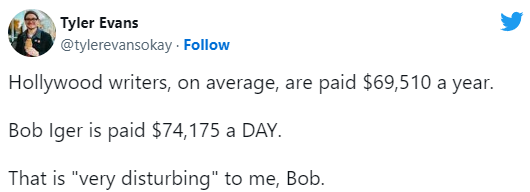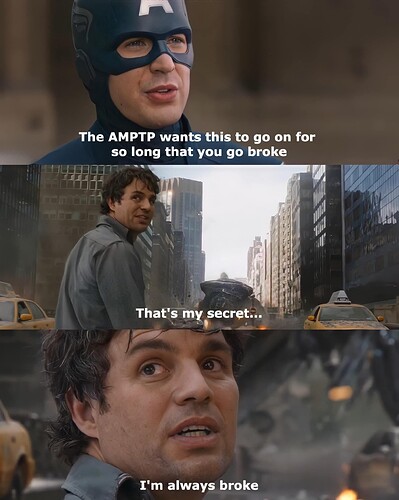The last time both unions were on strike at the same time was 1960. Hollywood will effectively be shut down.
Good. I also enjoy this meme after it came out that the suits want to drag this out and make them all broke:
Also I had no idea Fran Drescher was the president of the union.
The studios/streaming services hiding the numbers is just a massive red flag in these negotiations.
Yeah, and she jetted off to Italy this past weekend to serve as a Dolce and Gabanna brand ambassador. Not a really good look.
Great!
“The first thing we say to each other when we see each other, is, like, ‘Yeah, it’s really fucked up—all my residuals are gone!’ ” Emma Myles, who spent six seasons playing Leanne Taylor, an ex-Amish meth addict, told me. “It’s always the first thing to come out of our mouths, because it’s so crazy and unjust. And everyone thinks we’re kajillionaires.”
The streaming landscape really messed up how residuals get calculated. I’d say its the #1 grievance for both the actors and writers. Notably, it’s the point that the studios are unwilling to negotiate on.
I understand why the actors are striking, but does anyone CARE that the actors are striking?
The union’s national board is expected to meet Thursday morning to call a strike, which would immediately halt scripted film and TV production by the companies represented by the Alliance of Motion Picture and Television Producers.
Aren’t all scripted film and TV productions already stopped due to the writers’ strike? It seems to me that the actors going on strike isn’t actually going to change the current situation… though I guess it adds another condition on the resolution.
It’s like if my washing machine were to break during a power outage; sure it’s bad, but it’s not like I was washing any clothes anyway…
Well, not necessarily.
You got to do ADR (additional dialogue recording)? Re-shoots? Promotional material?
Basically this kills all post production as well. There were also likely a few productions still going as they were past the writing phase before the WGA strike started. But, that was probably very few things.
It just completely stops all production though, no way to wriggle around it.
It still impacts quite a bit. For example, actors cannot attend press junkets or do anything to officially promote a production. Oppenheimer will not enjoy the normal lead-in of interviews and social media promos, or Ahsoka, or etc…
Also, the WGA strike impacted some overseas productions, but some have found ways around it by using non-union local writers. With SAG-AFTRA joining the strike, many of those productions will be halted.
As mentioned above, any movie or TV show that had already been fully scripted and was currently deep into production or in post-production could have continued on mostly unaffected by the writer’s strike, as long as no rewrites or script changes were required to complete production. With the actors now also on strike, everything grinds to a halt. Nothing that was still shooting scenes in production or having actors do video or voice work in post-production can move forward, actors cannot do press tours or public appearances to promote movies or shows, they can’t even be interviewed or have pictures taken for articles in publications like Variety or People if the content could be construed as promotional in any way. With the actors joining the writers on strike, the entertainment industry has ground to a halt. Expect COVID-like delays between seasons of your favorite shows again, and months-years long delays on movie releases as well. Get ready to see a resurgence of UK, Canadian, Korean and other foreign-produced shows showing up as new content on streaming networks and cable/major TV networks as well, and of course the old Hollywood strike standbys, reality TV shows and gameshows.
This is appalling, and why I 100% support the WGA and SAG-AFTRA strikes. Streaming networks, including those owned and operated by Disney, Paramount, NBC-Universal and other more traditional movie/television production studios, have made a goddamn fortune off of mega-hit streaming shows, yet both up-front contracts and residuals for writers and actors involved in said shows are still set at rates that reflect a time when streaming was a huge new gamble, not a verified successful media content delivery system that now rivals cable/network television and theater movies. It is reprehensible that an actress makes more money in residuals from a handful of guest appearances on a nearly 20-year old television show than she makes from being a series regular on a massive global hit streaming show.
The studios and streaming services are making plenty of money off their content. It is time they stopped acting like streaming is some precarious experiment that could collapse at any moment and start paying actors, writers and crew on streaming shows wages and residuals commensurate with standard television contracts.
There’s clearly a lot of financial shenanigans going on with streaming as we see a lot of shows being pulled just a few months after being released for obscure write-off and compensation purposes. It’s seems like slowly the shift to online has enabled networks to weasel out of the past compensation models.
Part of the issue in this example is the way streaming is weighted towards initial launch views. Law & Order appears in reruns all the time, so it’s easy to see how/why she’d be getting checks for those appearances. For Orange Is the New Black, it’s likely that most views of the show occurred when it was new and now it really is a trickle of views.
The key, of course, is that there’s no way to verify that since streamers hold all the data and everyone just has to take their word for it when they say a show is or isn’t being watched. Even so, actors and writers need to negotiate a better residual payout structure for streaming since it’s likely that rerun/syndication isn’t something they can count on for streaming.
This too. Imagine if you were on the Willow show, expecting to get paid.
Sorry, why not?
Zoom doesn’t exist?
The Hollywood Reporter reached out to SAG-AFTRA about Drescher’s Dolce & Gabbana trip, and a representative said the appearance was tied to “brand ambassador” work. “This was a commitment fully known to the negotiating committee. She has been in negotiations every day either in person or via videoconference. President Drescher is managing a physically demanding schedule across three time zones, overseeing negotiations and working on-location daily as well as managing her parents’ needs in [Florida]. She is returning to the States and will be on the ground in L.A. tomorrow, and will continue to chair our negotiations.”
Also clearly there was nothing worth negotiating over, as they left without a deal. They were supposed to be done by the 30th, and the networks couldn’t agree with a deal.
Was she supposed to miss a non SAG event she had already scheduled because the networks were playing hardball?
Plenty of actors are about to need to survive off of “brand ambassador” work now.
The THR piece feels like it was published at behest of the production companies in an effort to sow discord. She was back this week before negotiation closed.
Yeah, seems like a bit of pearl-clutching.
“It’s very disturbing to me. We’ve talked about disruptive forces on this business and all the challenges we’re facing, the recovery from COVID which is ongoing, it’s not completely back. This is the worst time in the world to add to that disruption,” Iger said. “I understand any labor organization’s desire to work on behalf of its members to get the most compensation and be compensated fairly based on the value that they deliver. We managed, as an industry, to negotiate a very good deal with the directors guild that reflects the value that the directors contribute to this great business. We wanted to do the same thing with the writers, and we’d like to do the same thing with the actors. There’s a level of expectation that they have, that is just not realistic. And they are adding to the set of the challenges that this business is already facing that is, quite frankly, very disruptive.”


